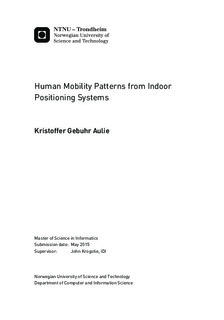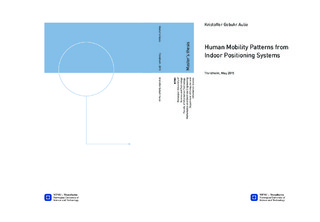| dc.description.abstract | Outdoor positioning systems such as GPS are already a natural part of people's daily lives, being utilized in various applications such as navigation, and location aware services. One does not need anything more than a smart phone in order to take advantage of the services the GPS technology has to offer. As the GPS signals do not reach devices indoors, an enormous market is yet to be exploited. Therefore, indoor positioning systems are expected to enter the market by storm in the next few years. Cisco MSE is such a system, collecting anonymous indoor positioning data which may be utilized in order to provide indoor location-based services. This system is utilized at Norwegian University of Science and Technology (NTNU) today.
In this thesis, a web application prototype is created in order to interpret, analyze, and visualize the anonymous indoor positioning data collected by the Cisco MSE system at NTNU Gløshaugen. The goal of the application is to identify optimal methods for visualizing indoor human mobility patterns in order to present the available data in a useful format for potential stakeholders. The application presents visualizations of the amount of movement on campus, the amount of movement between buildings on campus, the accuracy of the registered positioning data, and the usage of exits and entrances in the buildings. The project followed the Design Science Research method, first creating a proposal for a new research effort, before collecting requirements from potential stakeholders, resulting in a tentative design. Then development of the application or artifact is performed before evaluating the application.
Evaluations concluded that the information provided by the prototype is considered useful for potential stakeholders such as facility management, and that future applications tailored for their specific use cases can assist them in their work significantly. | |

